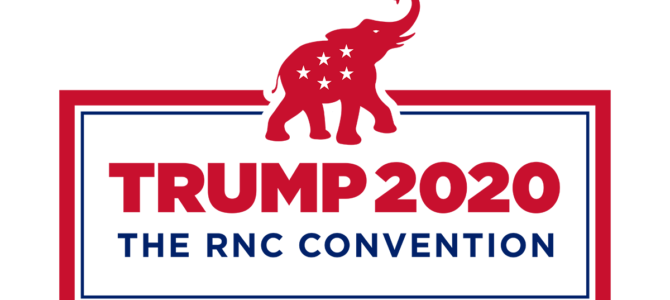
Night one of the Republican National Committee’s first-ever remote convention kicked off Monday, rejecting Democrats’ hosted model for a faster-paced, single-location-centered event that beat its competitor in production value and rally atmosphere, although still stunted by the lack of a live audience.
Activists and everyday Americans stole the show, telling moving stories of the fights, lessons, victories and tragedies that brought them to that stage, skillfully parlaying those stories into specific policies they support the president on. While some veteran public speakers struggled in an empty room bereft of boos, cheers, and applause, the understated and often emotional deliveries of the less-experienced speakers hit the high notes of the evening, moved in between by political ads.
The convention’s focus on America’s promise highlighted minority and immigrant voices, but still suffered from biased coverage that repeatedly interjected to accuse Republicans of racism. The same public and corporate media companies that cut off speeches at the RNC ran last week’s Democratic National Convention without interruption. Despite the attacks, for many loyal corporate media consumers the convention provided the longest slice of counter-programming they’d been treated to in years.
While the long-planned DNC relied heavily on pre-taped videos from cliche locations, moved along by rotating hosts, awkward music videos, and Milwaukee’s empty Wisconsin Center, the more hastily planned RNC abandoned its convention center plan, centering instead on the august and classical Carnegie Hall in Washington, D.C. Most speakers were live and on-stage, with many of those who beamed in filming from their homes or offices. While speeches once again went quickly without the interruptions of a cheering base, the lack of the DNC’s Hollywood moderators helped significantly with the pacing, preventing last week’s variety show atmospheres.
The videos kept up, with many alternating between dark imagery of mob-led arson and cheering people waving American flags while uplifting music kept the pep-rally mood from descending into negativity. Speakers followed the model, mixing personal anecdotes with praise for the president, attacks on Democrats, and warnings about the stakes.
New York City’s Cardinal Timothy Dolan, one of the most prominent Catholics in America, delivered a beautiful invocation that critiqued American politics gently from the perspective of the church. The invocation, from the politically careful archbishop who has opened up Democratic and Republican conventions before, stood in marked contrast to messaging from New York City’s mayor and the state’s governor, for example, praying explicitly for religious freedom, “all lives,” for the police, for unborn children, and for the elderly in nursing homes.
Republicans did not escape unscathed: Dolan invoked refugees and immigrants at a time President Donald Trump and his opponents continue to clash over economic, security and, most recently, COVID-19 restrictions the president has pushed for on outside entry.
The event focused on “the promise of America,” with Andrew Pollack, whose daughter was killed at Parkland high school, and Maximo Alvarez, who fled Cuba as a child when communist Fidel Castro seized power, dominating the evening.
“In 2018, a gunman walked into Marjory Stoneman Douglas High School in Parkland, Florida and changed my life forever,” Pollack began. “My name is Andrew Pollack; his name isn’t worth saying; one of the seniors walking in the hall that day was my beautiful daughter, Meadow.”
Pollack rose to prominence in fierce opposition to Democratic politicization of the mass murder. Today, he travels the country telling the story of his daughter’s short life and heroism, and on Monday switched expertly between tragedy and progress, painting a picture of a caring president and a scathing indictment of an uncaring media’s opposition.
Alvarez first gained national attention with the unscripted and emotional story of his family’s flight from tyranny in Cuba, told at a Florida business roundtable hosted by the president. “The country I was born in is gone, totally destroyed,” he said Monday, reprising his warning to America. “When I watch the news of Seattle, Chicago, Portland and other cities, when I see the history being rewritten, when I hear the promises I hear echoes of a former life I never wanted to hear again. I see shadows I thought I had outrun.”
“I still hear my dad,” he finished, choking back tears: “There is no other place to go.”
Herschel Walker, a former professional football player, black man and longtime friend of the Trump family, also stood out, slamming Democratic accusations of racism, and combining emotional appeals with funny memories of the Trump wearing a suit on Disney World’s “Small World” ride when their families vacationed together.
When Democratic State Rep. Vernon Jones, also a black man, attacked Democratic nominee Joe Biden, PBS cut to a panel calling the president a racist. The DNC, by contrast, ran uninterrupted on the taxpayer-supported station.
Other political hopefuls included Kim Klacik, a young, black, Republican woman who went viral last week with a video assaulting Democratic dominance in Baltimore, and Sean Parnell, an Army veteran whose heroic service in the war in Afghanistan earned him two Bronze Stars and a Purple Heart.
Minority Whip Steve Scalise and Amb. Nikki Haley fell short, delivering carefully scripted, expert political speeches in an evening otherwise characterized by raw and emotional reality, while Kimberly Guilfoyle’s usually popular attacks failed to lift off without the live audiences loud and boisterous speeches excel with.
Keynote speaker Sen. Tim Scott closed the evening as 11 p.m. approached, drawing on his grandfather’s segregated childhood and lifelong struggles with his rise to the top of American politics to cap the night with American optimism and a rejection of cancel culture and identity politics.
Three more nights remain, with Tuesday night set to focus on American opportunity, Wednesday on American heroism, and Thursday on American greatness. The president, who appeared twice Monday evening with live participants and once this afternoon with a speech to delegates, plans to appear each night before closing the four-day event with a South Lawn address and a fireworks display on the National Mall.








